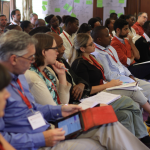Taking Ideas to Action: Why partners and context matter in scaling Inclusive Business
The common challenges businesses operating in developing countries face are widely known. There are plenty of tools, strategies as well as different service offerings available tackling those risks. However, when it comes to Inclusive Businesses and working with low-income communities – it is not business as usual. Challenges and opportunities are different and more demanding. This makes it difficult for many aspiring and promising inclusive businesses to move from pilot stages to scale.
Is there a key to success?
As a facilitator for Inclusive Business, there are two major lessons learnt with respect to business development we made at the Inclusive Business Action Network (IBAN): Access to the right information and partners can be a key to success. Although it might sound simple, it is hard and complex to achieve.
It can be illustrated by using the example of our Inclusive Business Sector Dialogues. The Dialogues are a

training

and learning format for business representatives, enabling exchange and fostering peer-learning within a sector and region (e.g. Health Argentina, Affordable Housing in Nigeria and Ghana, Affordable Energy in Ghana, Fast Moving Consumer Goods in Egypt). They consist of different elements:
- a written practitioner guide with sector specific practical knowledge,
- a public event to raise awareness and a practitioner workshops providing business representatives space for exchange and networking and
- site visits giving insights into opportunities and challenges of project examples.
What are the key findings?
Lesson 1) ‘The more specific knowledge the better’
For Inclusive Businesses it is not only about offering affordable products or services for low-income communities – it is also about acceptance, availability and awareness. It is about specific knowledge of characteristics of a sector, of local dynamics, of the preferences of communities and about what worked and what didn’t in those contexts. In the housing sector for example, knowledge on land rights, informal settlements and available micro-mortgages is essential for businesses offering affordable solutions. In the Fast-Moving Consumer Goods (FMCG) sector, low income consumers have different preferences with respect to taste and packaging compared to other income-groups. In addition, food subsidies by governments hugely impact the distribution channels and availability. All these aspects need to be understood and considered within the business model as they lead to success.
This is why entrepreneurs participating in IBAN’s Sector Dialogues receive customized input and training towards scaling their Inclusive Business model. It entails sector-specific as well as regional market insights from international and local experts and baseline assessments before the workshops. During the dialogues businesses have then the opportunity to discuss with peers and IB experts to jointly develop solutions for challenges.
Lesson 2) ‘Building Partnerships is essential, for businesses as well as for supporting organizations’
The Dialogues live from the expertise and inputs of all kind of different practitioners in the field of Inclusive Business – like Investors, networks and local expert. Partnerships are crucial for developing the trainings but even more for businesses wanting to scale their operations. This is supported by the findings of a recent research on the importance of Partnership Ecosystems by Ted London from the William Davidson Institute.
In addition, we would like to stress the importance of Inclusive Business Development Service (IBDS) Providers. They not only provide expertise during the Dialogues but can follow-up with businesses on topics discussed during the workshops and translate them into their strategies and daily work. However, working with different IBDS has shown that there is no common set of advisory skills or tools. Therefore, we support the idea of creating a mutual understanding of guiding principles for advisory on Inclusive Business – as Mayke Harding from the Inclusive Business Accelerator already stated in her blog post.
Those key findings are valid for all sectors we worked in so far. Having them in mind, we would like to highlight upcoming publications and events:
- If you are working in the FMCG Sector in Egypt and Tunisia stay tuned for our baseline assessments of the Fast-Moving Consumer Goods Sector published in October. In addition there will be upcoming events at the end of this year / beginning of next year in Egypt and Tunisia.
- As our Inclusive Business Sector Dialogues are hosted and developed based on a partnership approach - don’t hesitate to contact us to find out more via info@ib-an.net. Upcoming dialogues will focus on affordable housing, affordable and clean energy and FMCG.
This blog is part of the September 2016 series on Inclusive Business Development Services, in partnership with the Inclusive Business Accelerator. Don’t miss the whole series on support available to inclusive business from practitioners, donors and intermediaries including Afrilabs, DFID, Endeva, EY and many more…